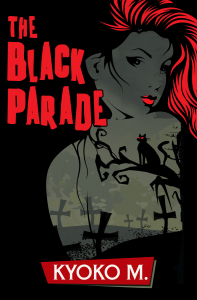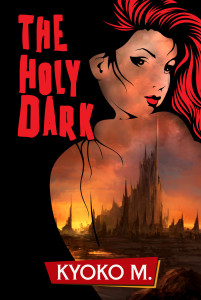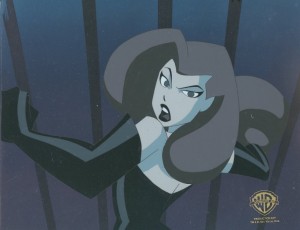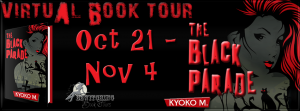
This lady knows.
Self-publishing is a lot of things. It’s scary, exciting, and still in its toddler stages, stumbling around bumping into tables and giggling as it spins around in circles with a bucket on its head. However, with the rise of self-published fiction smashing through the bestsellers lists, there is also a huge section of mass media devoted to exploiting it. Particularly, the sleazy jerks who keep perpetuating myths about self-publishing in order to sucker new authors into giving them money. I’ve been a self-published author for almost five and a half months. I’m going to give you the skinny on some of the bullcrap I’ve heard from these snake oil salesmen in the hopes that it may someday help a newbie author avoid falling under their spells.
8. “You’ll be the next E.L. James!” Not that you’ll write terrible smut based on terrible teen vampire fiction, but your self-published novel will fly off shelves and sell a billion copies and you’ll be a household name overnight and you’ll have so much money that you can swim through it like Scrooge McDuck. Nu-uh. There are hundreds of websites and spambots out there lurking with links to teach you how to become a bestseller, but don’t you dare listen to them. What I’m about to say is disheartening, but it’s totally true: there is no magic bean that you can plant and grow your novel into a bestseller. There just isn’t. You’re going to be tempted by all kinds of Twitter accounts and blog posts that swear they can teach you how to become E. L. James, but while they might be able to help you get exposure, it ain’t gonna happen. There is no bonafide, 100% definite way to become a self-published bestseller. Get that thought out of your head first before you do anything else. Otherwise, it will only hurt you more.
7. “You can totally design the cover yourself. You don’t need a professional graphic designer or artist!” NO. STOP THAT. NO. *whaps you on the nose with a newspaper* This is just plain offensive to me. You know that old saying, “You can’t judge a book by its cover”? That only applies to people, not actual books. Ironic, but true. Do not—I repeat, DO NOT—open Microsoft Word or Paint and fart around for two hours and claim that you’ve got a good enough cover to sell to people for actual money. You must be an advanced user of Photoshop, or any of the other massively successful art design software, in order to make your own cover for your book. I don’t care if you only write short stories or anthologies or autobiographies. Do not shortchange an entire industry’s worth of madly talented people by thinking it’s just a “do-it-yourself” project.
Most people choose to look at a book up close based on the cover. It’s all about your color scheme and who or what appears there. If you don’t believe me, check out your own bookshelf. Pick about five books and spread them out over your bed. Which ones did you pick? How did you notice them in order? Do you remember the story behind how you bought it? I guarantee that at least three out of the five books you pick were chosen because of a vibrant cover.
Your cover is like a tiny little boat you send out on the ocean. You don’t want a boat full of holes that is duct taped together. You want it to be sea-worthy. No one said you had to empty out your piggy bank and buy the most expensive, lavish cover of all time. You simply need to have a legit, eye-catching, professional cover. There are affordable options out there for you to use, so please, PLEASE use them. Nothing kills your chances better than a crappy cover. NOTHING.
6. “You don’t need an editor! You can totally self-edit!” NO. What did I say? *whaps you on the tuchus with newspaper* This is also very hard to hear when you’ve got shallow pockets and have lived as a broke ass college student for years. Many people think they are good editors. Many authors think they can catch their own mistakes. To quote our beloved Lex Luthor… “WROOOOOOOOOOOOOOOOOOOOOOOOOOOOOOOOONG!”
We are human. We have eyeballs. We also have a skewed perception of our own writing. If you’re a novelist like I am, when you read your own work, you often enter the state of mind you were in while you were writing the draft. This causes a phenomenon where your eyes will see what you thought you wrote, and not what is on the paper. This is exactly why experts like Chuck Wendig and Stephen King suggest either reading your work out loud or printing it out and following along with a red pen and your finger. If you stare a computer screen for a living, chances are, your eyes are filtering out a LOT of stuff. You’re never going to be able to catch all your own mistakes, no matter how talented you are, no matter how sharp your eyesight is, no matter how baller your B.A. in English Literature might be. Short of being a god, you can’t do it.
Authors are stubborn people. Most of them don’t want to hear this, but it’s the truth. However, the good news is that editing is also something that isn’t as hard to find as one thinks. The nice thing is that many professional editors and copy writers and beta readers are willing to work out a payment plan. You can have them edit sections and pay them for what you can afford rather than breaking the bank.
The only way to be a successful, professional self-published author is to present professional work. No matter how spunky and awesome your main character is, or how fresh your poetry sounds, no one is going to give a crap if you have run on sentences and dangling participles and comma diarrhea. Editing is your friend. Your best friend. Your hot best friend you have unresolved feelings for in your pants. Indulge them.
5. “Social media is optional. All you need to do is write the book and it sells itself.” Have you ever seen a television show that doesn’t have commercials for it? No? Then why in blue perfect hell would anyone think you can sell a book without marketing it? I know it sucks. I know it’s hard. I know it’s like screaming into a black hole. However, it’s necessary.
Without a publisher or a literary agent, you are the focal point. Every success is going to be on your shoulders, and thus, every failure will also be on your shoulders. Social media is often difficult and frustrating to navigate, but the reward is worth the trouble.
However, let’s take an aside and discuss the difference between marketing a self-published novel and hawking a self-published novel. Your goal is to create interest through conversation and engagement. You are not the old janitor on that Chappelle’s Show sketch going, “HOLLA HOLLA HOLLA HOLLA HOLLA HOLLA HOLLA HOLLA HOLLA HOLLA HOLLA HOLLA HOLLA I’M TRYNA HOLLA ATCHA BITCH DONCHA HEAR ME?!” That is irritating and it’s not going to get you anywhere. For unknown authors, it takes a year minimum to build anything resembling a following for your book, no matter what genre it’s in. There are all kinds of social media suited for your needs—starting with Twitter and Facebook and expanding outward to Tumblr, Reddit, Pinterest, and Youtube. You have plenty of chances to test them out and see which one works best for you. It’s all about trial and error. Some people will run right out and buy your book. Thousands will pass. Some will put in on their shelf to read later. Don’t cry. It’s all a part of the game. If you write a good book and you take the time to learn how to engage people, you’ll get there. Be patient. Be stubborn. Believe.
4. “Reviews will pour in unprovoked. Just give it time.” So I’ve already mentioned how vital it is to get a good, professional cover for your book. It’s enormously important. However, one thing people sometimes gloss over is reviews for a book. This applies in particular to online retailers like Amazon, Smashwords, Barnes & Noble, and iBookstore. Most people who are considering whether or not to buy a book need a tipping point. This refers to a number of good reviews, or a number of reviews in general, that confirm their belief about if they want to take a chance on your book or not.
Sadly, lack of reviews is no reflection on the quality of a book. Neither is a surplus of reviews. (I mean, come on, look at how many reviews Twilight has. Jeebus.) However, it is still an important numerical figure that will impact your potential readers whether you like it or not. How do you fix this problem? Fortunately, it’s not impossible to find a solution.
The first step is politely asking friends and family to read and review the book. This may make you uncomfortable and insecure, but it’s usually the easiest way to get about three to ten positive reviews for free. After all, in the beginning, it’s about getting the ball rolling. If your friends or family members are hesitant, tell them they don’t have to be detailed– just write a paragraph about what they liked or why they liked it. Most of them will say yes if you ask for something that simple.
The second step is to find a database of book bloggers and book reviewers who review your genre and create a wishlist for yourself. Read their submission terms from top to bottom and choose the ones you believe will read and enjoy your novel. Do not create a chain email and blast them all. You will not get a response. That’s rude and disrespectful. If you expect them to take the time to read your book, you must take the time to ask them in a professional manner. This is quite time consuming to do, though, so it’s best to knock it out a handful at a time. Do a couple a day throughout the week. Some will not respond, some will say no, but some will say yes, and they are very important for the future of your work. If you get them hooked and you’re writing a series, chances are that you can rely on them to review your second or third book when it comes out. Brand loyalty is a good thing, trust me.
The third step is to then post your book somewhere where reviews are frequently read and are detailed, like Good Reads. Most people on Amazon will pop by and read the best and worst reviews of a product. People on Good Reads do the same, but they expect quality rather than volume. They expect to find out exactly what went right or wrong with the novel instead of a general overview of the contents that you usually find on Amazon or other book retailers. This is going to be a slow burn as most self-published novels tend to get buried underneath the traditionally published ones on Good Reads, but it can definitely help your book get a good reputation. If people see that it is shelved and positively reviewed a lot, chances are they’ll put it on their own shelf to read someday.
3. “You don’t have to get a professional website/blog. Any one will do.” Jim Butcher once said, “Keep conducting yourself like a professional, and you’ll get someone to believe that you are one. If you’re lucky, maybe even yourself.” Traditionally published authors have to conduct themselves like professionals (unless they are Laurell K. Hamilton, but that’s a story for another day…) in order to keep selling books. People take them seriously because they have well-made book covers, nifty Twitter pages, and easy to use websites. You should do the same because while you may not have a big, wealthy publisher backing you up, you still need the same prestige and reputation that is entailed with being a professional author.
Websites can also get expensive and painful for your wallet, but the best thing to do is start small. Start with any of the free web domain hosts and work from there little by little. Include all the things that make you interesting and back-link your social media to land on your homepage. The website will eventually become the central hub for your online presence. You want it to become a Launchpad not only for your book, but also for any other activities that you do as an author, and as a person. Creative people typically have more than one outlet, and your website is the best way to show people that you can do stuff other than write about pretty men and sarcasm.
2. “Your book is unique and that’s why it’s going to sell millions!” Take a note from Tyler Durden, babies. “You are not a beautiful or unique snowflake. You are the same decaying organic matter as everyone else, and we are all a part of the same compost pile.” As harsh as that sounds, it’s also the truth. There is nothing new under the sun. Your novel is not the most original thing on the earth. I promise you that you can Google the plot of your book and find it’s been done somewhere else. Hell, someone might even do it better. But that’s not my point.
My point is, so what? Why should I read your book? Why should anyone? What’s your angle? Why should anyone give a rat’s left buttcheek about what you have to say? That should be your main focus as a self-published author—separating yourself from the pack. People don’t buy McDonalds because it’s delicious and nutritious. They buy it because it’s hot, cheap, and fast. That is what makes Mickey D’s different from the other chains. What you have to do is create that distinction as a self-pub author. You have to create more than just a great book. You have to create your own experience, your own brand, in order to draw in readers.
Think about your favorite authors, not their work, but who they are as people. How many of them do you know on a personal level? Are they funny? Are they quirky? What makes you care about them, and subsequently care about their work? These are the things that create longevity for authors both traditionally and self-published. If you can prove to the readers that what you have to offer is worth their time, then they will stick with you regardless of if your work is “original” or not. You have to connect with them in order to get your book in their hands. It won’t happen by magic fairy fart gas. It’s you.
1. “Anyone can be a writer, even you!” So most people in the world have hands with all ten fingers, and they can take these fingers and use them to scribble with a pencil, or pen, or the blood of children, and create something called writing. Technically, anyone can perform the act of writing.
But that doesn’t mean that they should.
Yes, anyone CAN be a writer, but not everyone can be a GOOD writer. One of the greatest lies self-publishing has taught the world is that anyone can write and publish. This is horseshit. Total butt-droppings of epic proportions. For as many beautiful authors as there are out there, there are a hundred-thousand hacks who will flood the market with steaming dung-heaps. I mean, Stephen Colbert did a segment on a section of published fanfiction that features human on velociraptor action of the sexual nature. So, no. Everyone can’t be a writer. Everyone can’t even be sane, let alone write.
This is where you come in. You will have to do everything you can to make a life jacket to help your book float to the top of the shit-ocean. No one said you had to be Stephen King, but you have to know the actual craft of good writing before you even attempt to self-publish. You don’t have to have a fancy edumacation or anything, but you do need to know the basics. You need to know about grammar and language laws. You need to know about story arcs and character development. You need to read awesome literature and then read terrible literature, and then understand what makes them different. Do this and you will be a good writer who sells books. Don’t do this, and Godzilla will creep up on your someday and ejaculate into your eyes. You can quote me on that.
And those are the biggest myths that I’ve heard as a self-published author. This subject is still on going, though, so I suspect there will be a part two to this list in the not-too-distant future. However, don’t be discouraged by anything that I’ve said. All that I intend to do with this post is set the record straight and keep new authors from falling into the Rancor pit. Pick up your light saber, young Skywalker, and prepare for your journey.
-Kyoko
 Guess what, my dears? The Black Parade is having another giveaway, and this time it’s the paperback version. All you have to do is enter here and you have the chance to win yourself a signed copy of my novel. It only takes a second.
Guess what, my dears? The Black Parade is having another giveaway, and this time it’s the paperback version. All you have to do is enter here and you have the chance to win yourself a signed copy of my novel. It only takes a second.



